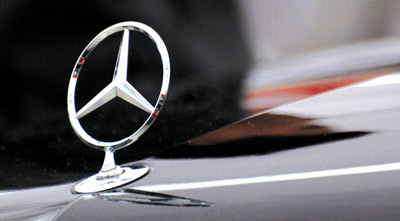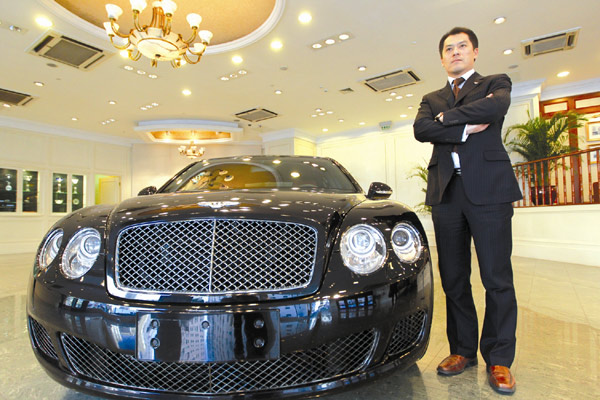Cars
Posh parade
Updated: 2011-01-14 10:41
By Patrick Whiteley and Yao Jing (China Daily European Weekly)
|
Hu Hailong, Bentley Beijing sales manager, says a luxury car also makes it easier for successful people to do business. CUI MENG / CHINA DAILY |
Luxury carmakers are gearing up for rich pickings in the Chinese market
While new taxes and license plate restrictions in China may curb growth of new car sales in 2011, the luxury car segment is gearing up to continue its glittering rise.
Sales of luxury vehicles - including luxury cars, SUVs, MPVs and sports cars - from 20 brands almost quadrupled from 2005 to 2009.
Last year, the growth of luxury cars topped 40 percent, thanks to the launch of an array of new models and an expanded production capacity to meet the demand of China's super rich.
The quick rise of individual wealth due to China's fast-paced economic development has been a major factor driving the growth of this segment, analysts say. By the end of 2009, the Chinese mainland had 875,000 millionaires, up 6.1 percent year-on-year, according to the 2010 Hurun Wealth Report - and top-end cars are on top of shopping lists of wealthy Chinese.
Jenny Gu, from JD Power and Associates, says owners of luxury vehicles in China are typically in the real estate, finance, mining, and export business and the unique psychology of Chinese people plays into the hands of luxury carmakers.
"Modesty is not a prominent Chinese characteristic but confidence is, whether founded or unfounded. They are not shy about displaying their success with a propensity to show off their success through brand name processions," she says.
Audi was the first foreign luxury carmaker to enter the Chinese market in 1988 and has always been a favorite with local government officials. As a result, the black Audi sedan has been seen as a symbol of power and prestige and has been in strong demand.
In October last year, Audi's accumulated sales since it entered the market passed 1 million units and Audi revealed an aggressive plan to move another 1 million vehicles in China over the next three years. Audi produces the A6 and A4 sedans as well as the Q5 SUV at a joint venture with its parent Volkswagen Group and China's FAW Corp.
In the first 11 months of last year, Audi's China's sales topped 200,000 units, maintaining its two-decade reign in the country's luxury car market.
But rivals BMW and Mercedes-Benz are not far behind.
|
 Mercedes-Benz is said to be moving into “niche market segments”. LU JIANSHE / FOR CHINA DAILY |
From January to November 2010, BMW sold 152,866 vehicles - a massive rise of more than 90 percent from a year earlier - and Mercedes-Benz moved 129,500 vehicles in the same period, swelling 119 percent.
Inspired by this strong performance in 2010, German carmaker Daimler AG's joint venture with Beijing Automotive Group expects sales to grow more than 60 percent this year.
Ash Sutcliffe, editor of China Car Times, says BMW could be the one to watch in the premium luxury segment. "BMW is expected to launch a stretched wheel base 3-series that will compete against the unstoppable Audi A4L, which has so far led the luxury market in China and regularly trounces BMW and Mercedes in sales figures," he says.
"Mercedes is moving into niche market segments that BMW and Audi have so far ignored: station wagons and mini MPV's, whilst BMW is planning to launch the 1-series and X1 SUV as locally made vehicles to bring down the cost.
"Audi appears to be content on making sports sedans, although it will introduce the A5 as a locally made product and will introduce the A7 later this year."
On the super luxury front, Rolls-Royce Motor Cars Ltd plans to sell 800 cars in China in 2011 as it aims to raise sales eightfold in two years in the world's largest auto market.
The automaker delivered almost 500 cars in China in the first 10 months of 2010, compared with about 100 for the whole of last year, Paul Harris, the company's Asia-Pacific regional director, says.
"The Chinese market in general is showing only one direction," Harris says. "That's exceptional growth, and it's going to be ongoing for quite a while."
In China, a Rolls-Royce Phantom starts at 6.6 million yuan (769,000 euros), and buyers pay 4.1 million yuan for the Ghost model.
Bentley is also enjoying heady sales. In 2009, Bentley sales hit 421 to help China surpass Germany as the third biggest market for Bentley, after the United States and Britain. A spokesman for Bentley says sales in 2010 were more than 800.
Hu Hailong, Bentley Beijing sales manager, says a luxury car does not only a show off wealth but also makes it easier for successful people to do business.
"This is the main motivation to transfer the former customers of Mercedes-Benz and BMW to Bentley and Rolls-Royce," he says.
Hu says the main Bentley customers come from the mining industry and the best-selling model is the Continental Flying Spur, which costs 30 million to 40 million yuan.
As for competitors Maybach and Rolls-Royce, Hu was confident his brand had its own unique selling point.
"We do not regard Maybach as a rival because it does not share the same long history as us and although Rolls-Royce has been acknowledged by more people as it came to China earlier, it is often considered as high-profile," he says. "Bentley is more low-profile and is well accepted by those who don't want to show off."
Bentley, like many of the other luxury brands, will set up more dealerships in second- and third-tier cities in 2011 to attract more business through auto shows and other activities. It plans to invest 300 million yuan to add 14 more dealers in five years.
Sutcliffe thinks that Aston Martin will have the biggest market share to gain in 2011 although Ferrari and Lamborghini will both have strong market growth.
"Aston Martin is special as their cars have the performance of a super car but with the luxury level you would find in a Rolls-Royce," he says. "Porsche will do well with the introduction of the V6 Panamera.
"Other regional super carmakers such as Spirra from South Korea and Mitsuoka from Japan have launched in 2010 and will sell a few cars in China, but their names are too unfamiliar to Chinese consumers, so the big winners will continue to be European brands with a long pedigree."
Specials

President Hu visits the US
President Hu Jintao is on a state visit to the US from Jan 18 to 21.

Ancient life
The discovery of the fossile of a female pterosaur nicknamed as Mrs T and her un-laid egg are shedding new light on ancient mysteries.

Economic Figures
China's GDP growth jumped 10.3 percent year-on-year in 2010, boosted by a faster-than-expected 9.8 percent expansion in the fourth quarter.
